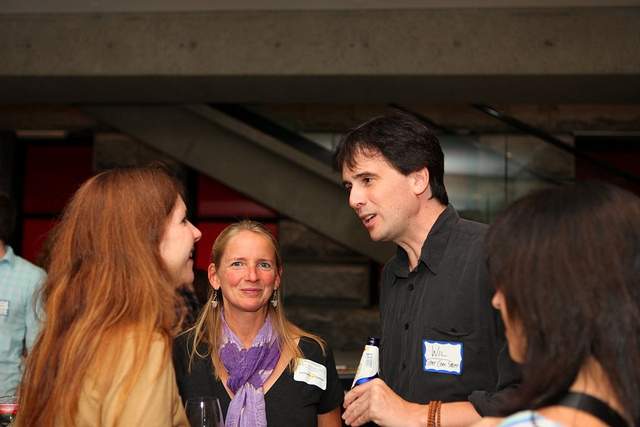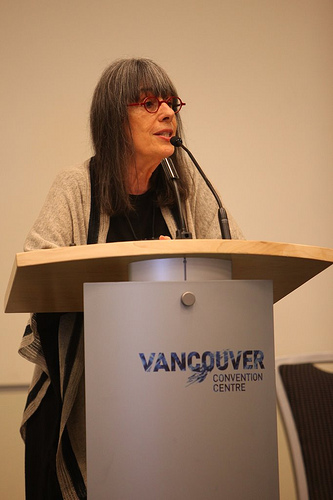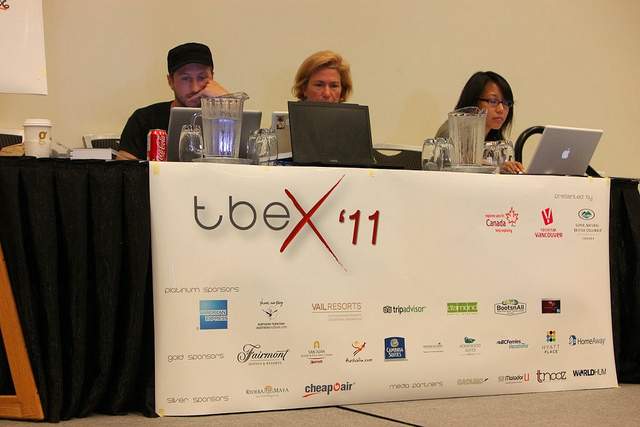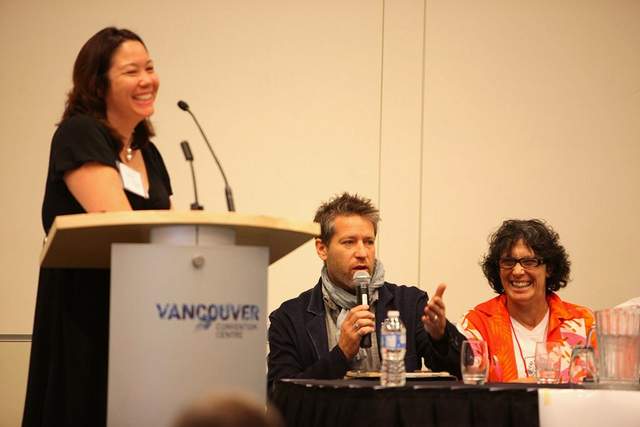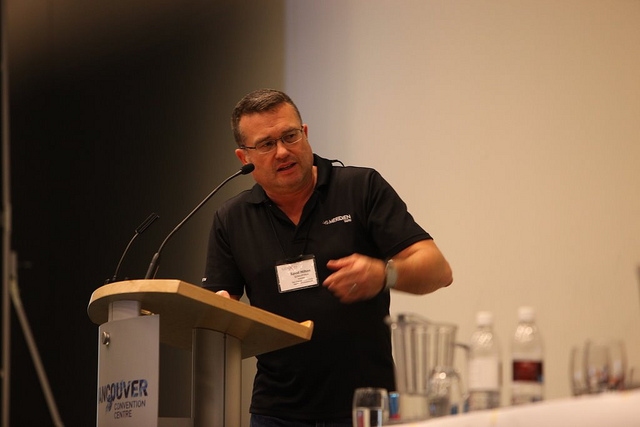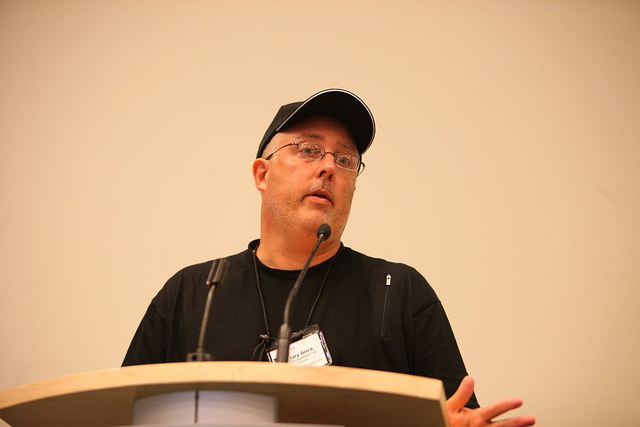As with the 2010 Travel Blog Exchange, there were plenty of lessons to be learned at TBEX. From tips on SEO and monetization to the art and craft of telling a good story, TBEX 2011 offered lots of advice for new and more experienced writers. But perhaps one of the most important things that TBEX 2011 helped many of us realize (or remember) is just how diverse of a group we are. Big blog or small, niche-focused or more general, narrative or non-narrative, monetized or not, every one of the 500 or so blogs run by attendees is different, and there is room for us all. We’re a young industry and a growing force, still finding its place in the travel sphere.
The conference started with a humorous video about self-important, egotistical travel writers (and a story about one blogger’s demands for a Presidential suite) and the issue of professionalism was one brought up several times throughout the event. A glance at the crowd-sourced “Board of Ethics” paper in the lobby confirmed that we don’t all agree on what standards bloggers should be held to, but there is one thing that’s certain and that is that the actions of one can reflect on travel bloggers as a whole. Overall all though, the weekend was one of camaraderie, connections, and some entertaining and informative sessions. Here are eleven lessons bloggers can learn from TBEX.
It’s all about community
Between sessions and after hours, TBEX was all about networking. Not only are travel bloggers a fun, interesting bunch (we travel and are passionate about telling our stories), many of us also seem to realize that success is a lot harder on our own and that we have so much to learn from one another. One of the main messages in the “Branding and Niche Expertise” panel was to find “your people” and build a community. Trade tips, learn what works and what doesn’t, and help promote one another through links, guest posts, RTs, and referrals. There’s strength in numbers and the more successful your personal community is, the more successful you will be as an individual.
For good writing, think like a 3-year-old….but don’t be naive, and don’t write anything you wouldn’t say out loud
It’s easy to get in a language rut and fall back on cliches – the view is stunning, the hotel is luxurious— but this makes for boring writing. Crai Bower offered the suggestion to “think like a 3-year old,” ignoring those old cliches we’ve heard so many times before and instead looking, listening, tasting and feeling as if for the first time. However, Spud Hilton reminded us not to take it too far. He gave the example of the wide-eyed, clueless tourists raving about these amazing places – called cafes! – that you can find all over Paris and cautioned us not to be that person. Spud also warned against the danger of losing your authentic voice, instructing attendees not to write something we’d never say in real life (such as telling a friend about the “luxuriously appointed” hotel we stayed at).
Success takes time
Evelyn Hannon’s kickoff session – the story of how she started Journeywoman many years ago – was inspiring, and for me had two big takeaway messages: 1) Amazing success is possible, and 2) That success takes hard work, a ton of dedication, and lots and lots of time. BootsnAll CEO Sean Keener’s presentation on Sunday only reinforced that idea. Sean showed the crowd what BootsnAll’s growth has looked like over the years since it started in 1998, explaining that while it is possible to get to your “million,” (whatever a million means to you) that success doesn’t just happen overnight. You need to invest time and effort, set goals, and have a plan for getting there.
Companies want to work with you, but you need to bring something to the table
During one session, successful bloggers and company reps from American Express, Australia tourism, and Expedia talked about collaborations and sponsorships that worked and gave a few tips to those bloggers interested in pursing similar partnerships. Then the audience had the chance to pitch ideas…and that’s where things went south. What a lot of bloggers seemed not to grasp is that a great idea isn’t enough. You need to find a company that’s a good fit for the project and – perhaps more importantly – why you are the best blogger to promote their brand. Both the idea and your audience need to fit the “product” that company is selling, whether that is an actual product or a service or a destination. In other words, just like with a job interview, you have to prove why you are the best candidate for the position.
Research, research, research
In what was one of the most entertaining sessions of the conference, Robert Reid reminded us all of the importance of research, hard facts, and quotes from experts. Those things, he said, make up the scene – the valley and the trees and the flowers and the mountains. The writer’s personal experiences, he said, were like piss. When you have that beautiful scene, you can sprinkle a little more piss. When you don’t have the flowers and the grass and the trees as well, then you’re left with just…piss. The takeaway: quotes, facts and additional research can supplement your own experience of a place and can make for a richer, more informative post.
PR people are looking for hard data about your site
In the session on “Return on Investment,” attendees were able to get a window into the mind of the public relations professional. Though PR professionals are eager to work with bloggers, their first priority – as you would expect – is the client. They need to satisfy the clients requirements when it comes to getting the right coverage from a range of media sources. The more information you can give them about your site – your number of monthly visitors, number of Facebook and Twitter followers, number of newsletter and RSS subscribers, and anything you know about reader demographics – will help them determine what the return on investment for the client will be, and in turn to better advocate you as a good investment for press trips and sponsorships. Be transparent about your stats, never promise what you can’t deliver, and always follow up after a trip by sending all relevant links and clips to your PR contact.
Good list articles have personality – and a catchy title
At Bootsnall, we do a lot of list articles, and we agree with the non-narrative panel’s assertion that lists don’t have to be dry; they can have personality and flair. While the facts are important, you can also pepper your lists with humor, quotes, and personal anecdotes to make them more interesting to read. Intriguing titles are also vital. It seems the consensus is that while words like perfect, best, most beautiful, and stunning should not be used within a good article, using those words in a title can help get the post topic across quickly to your readers and can help you draw a larger audience. “Going negative” with “world’s worst” type lists can also draw more readers.
SEO 101: It’s all about links
SEO – or search engine optimization – at its simplest means how easy it is for search engines (and the people using them) to find your content. When someone types in a phrase, you want your site to be among the top results for relevant content. SEO is all about how you make sure that happens. While entire empires have been built on teaching people the fine points of SEO, the basics for newbie bloggers are a little more simple. Use relevant keywords/search terms in your post (but always write for humans first) and interlink to other posts on your site with good anchor text. Getting good incoming links from other authoritative sources can also help your site.
No one cares about you
At first glance, this statement is a bit harsh…but it’s also true. Outside of your friends and family, no one who stumbles across your blog really cares about you (at least, not at first). They care about the destination and about the story. If the only exciting thing about a destination is that you went there, your audience is not going to care. As Spud Hilton pointed out in the narrative writing session, when you were in 5th grade, they had to pay someone to read your writing. If you want people to read it now, it needs to be interesting and you need to take your blog posts beyond the “I went here and did this and then I did this and ate that” format.
But how do you do that? Through good storytelling that evokes the feeling of a place and tells the reader something about the destination or culture. Start with a good lede that captures the reader’s attention, then go onto the nut graph, the paragraph that explains the point of the piece and from which everything else should follow. Leave out the boring parts and things that don’t relate to your main point and finish with an ending that brings the reader full circle.
You can make money from your site, but don’t expect to get rich quick (or maybe even at all)
A select few travel bloggers make any significant cash from their blogs. Even fewer make enough for it to be a full-time job, and those that do have generally been growing their business for several years. Others seems to combine the revenue from their blogs with other projects like freelancing and selling e-books. If you’re just starting out, don’t try to monetize your blog for the first year. You likely won’t have the pageviews to make banner advertising worth the effort and sponsorships are best left to pursuing after you’ve established yourself as a personality and source of good content in your space.
As an industry we’re “in the third inning of a nine inning game”
This quote came from Gary Arndt, who presented on the “State of the Travel Blogging Union.” Gary pointed out that while travel is a huge industry, travel blogs are still relatively new and as bloggers, we need to step up our game. If we want to be treated like professionals, we need to act more professional. Robert Reid had a similar message. We need to stop thinking of it as “just a blog” and hold ourselves to higher standards. If we’re not journalists and not “just” bloggers, maybe we need a new word; he suggested that perhaps we write “jourblogs” and suggested the tongue-in-cheek title of “jourblists.”While I’m not quite ready to embrace that title, I agree that bloggers and online writers can and should up our game and strive for higher quality work as our industry grows.
What did you learn at TBEX? See what the Travel Blog Mob had to say about TBEX and Vancouver:
- 3 Cool and Affordable Places to Stay in Vancouver
- Travel Blogger Conference TBEX Improves in Vancouver
- TBEX One Week After
- Food Porn: A Photo Tour of Vancouver’s Granville Island Public Market
- Best of Vancouver
- Things to Do in Vancouver with Kids
All photos courtesy of ©KirstenAlanaPhotography/Galavanting.
